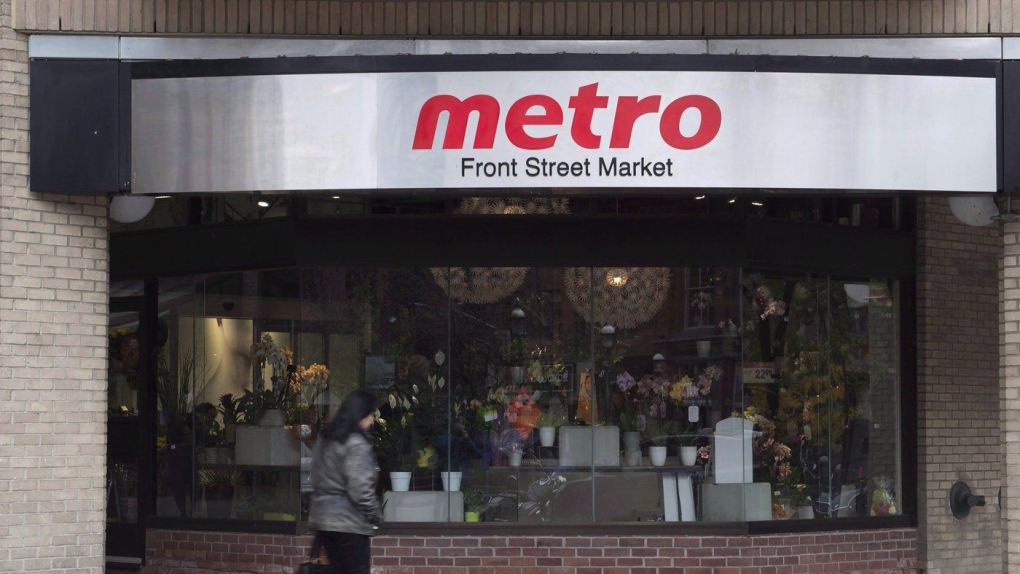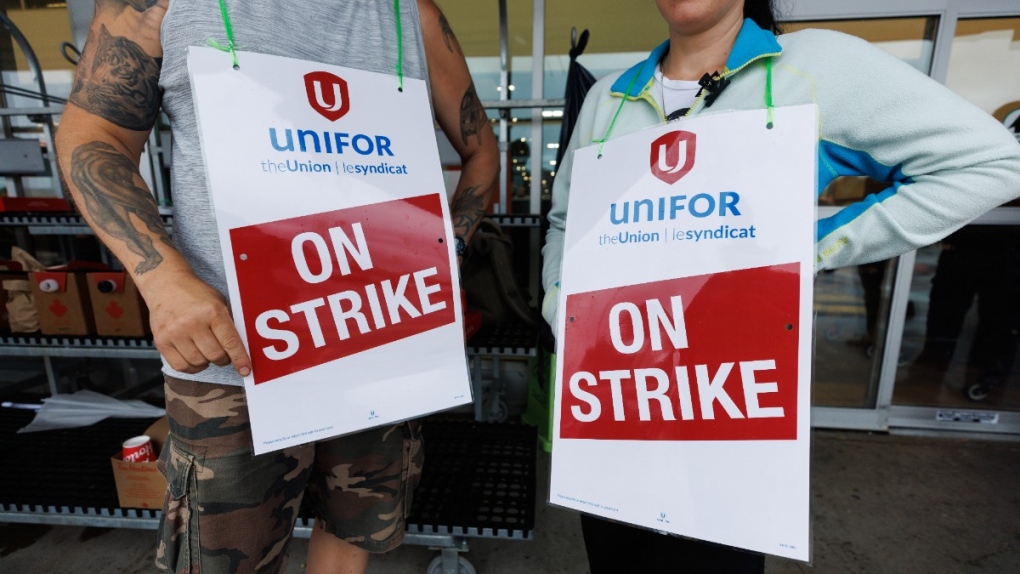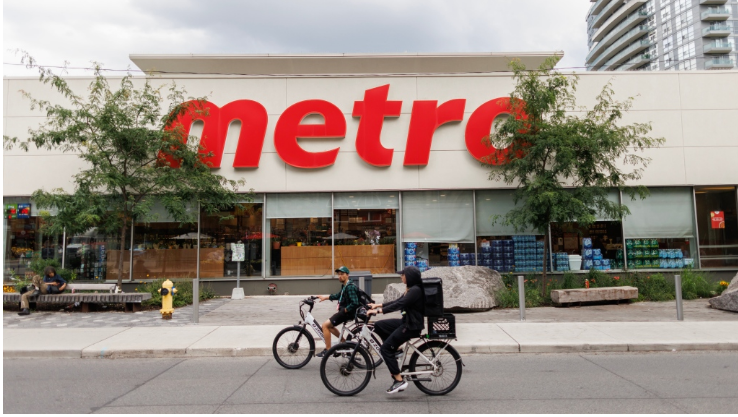Best CCTV Security Camera in Brampton

A woman walks pass a Metro grocery store in Toronto on Wednesday Nov. 1, 2017. THE CANADIAN PRESS/Doug Ives
Best CCTV Camera in Brampton
Thousands of unionized Metro workers walked off the job Saturday in what is the latest in a series of strike actions taken across the country in the past year.
Some 3,700 members of Unifor Local 414 went on strike, described as the largest in the union’s history and affecting 27 Metro locations in the Greater Toronto Area.
It comes as unionized workers at British Columbia’s ports rejected a tentative agreement late Friday night and as Manitoba Liquor Mart employees stayed off the job Saturday in their continued strike action.
“Interest rates, inflation, CEO profits soaring, profits in terms of what corporations are making soaring, while our members are struggling to get by,” Unifor national president Lana Payne said Saturday as Metro workers held their strike.
Although Unifor endorsed a deal with Metro, with Payne describing it as the “best agreement in decades,” the membership did not support it.
Payne added that it is not enough for the workers to live on or support their families, with 70 per cent of jobs part-time and average pay between $16 and $17 an hour.
She said that the workers, who put their lives on the line during the height of COVID-19 and later saw their pandemic pay cut, deserve a share of the money that they helped Metro earn.
Gord Currie, president of Unifor Local 414, added that some have resorted to food banks.
Canada’s Competition Bureau released a study in June that found the three largest grocery companies in the country — Loblaws, Sobeys and Metro — reported more than $100 billion in sales collectively and $3.6 billion in profits last year.
“Working people are fighting back everywhere, from the ports of Vancouver to grocery store workers here to Teamsters workers in the United States. This is not just happening here at Metro stores. It is the moment that we’re in and, you know, you can only push it so long where corporations are doing so well, the CEOs are doing so well and workers are getting crumbs. That is not going to work anymore,” Payne said.
A statement from Metro Ontario, a subsidiary of Metro, said it was “extremely disappointed” that a strike occurred despite the union endorsing the deal.
“The company has been negotiating with the union for the past few weeks and reached a fair and equitable agreement that meets the needs of our employees and our customers while ensuring that Metro remains competitive,” the statement said.
“The settlement provided significant increases for employees in all four years of the agreement, as well as pension and benefits improvements for all employees, including part-time employees.”
Larry Savage, a labour studies professor at Brock University in St. Catharines, Ont., told CTV National News that workers have a heightened sense of their own worth coming out of the pandemic.
“I think there’s a lot of anger and resentment as a result of the pandemic and the high cost of living,” he said.
“Grocery store workers, for example, literally put their lives on the line for their employers and for society more generally during the pandemic and now lots of them can’t even afford to pay their rent or their utility bills. So I think there’s a sense out there that workers are fed up and they’re demanding more and they’re using the right to strike to do that.”
Last month, about 1,800 striking Halifax-area education support workers returned to work after ratifying their latest contract.
More than 155,000 unionized federal public servants went on strike earlier this year, including 35,000 Canada Revenue Agency employees.
Last year, thousands of education support workers in Ontario also went on strike.
“I think there will be lots of labour disruption in the future, lots of labour militancy going into the future, until we see some of these companies redistribute their profits back into their workforces,” Savage said.
Cheap CCTV Camera in Brampton

Workers hold signs at a picket line outside a Metro grocery store in Toronto as workers rejected a tentative deal triggering a strike of nearly 3,700 grocery store workers in the Greater Toronto Area, July 29, 2023. THE CANADIAN PRESS/Cole Burston
Home CCTV Camera in Brampton
Twenty-seven Metro grocery stores in the Greater Toronto Area will be closed beginning Saturday as thousands of workers will be striking after they voted down a tentative deal.
Unifor, the union representing 3,700 Metro workers at 27 GTA locations, announced Friday evening the results of the ratification vote.
“This decision to go on strike comes after years of these workers being nickelled and dimed while facing increased precarity and eroded job quality. It comes after having pandemic pay stripped away. It comes at a time of record profits and soaring CEO compensation. It comes at a time when life has become simply unaffordable for so many of these workers who risked their health and safety during the pandemic,” Unifor National President Lana Payne said in a statement.
“We brought the tentative agreement to our members because it contained considerable gains, but our members are clear that it simply isn’t enough.”
A tentative deal was reached on July 18, following weeks of bargaining to initially avert a strike. In June, members voted 100 per cent in favour of striking.
Union officials previously said fair pay for all workers, greater access to better benefits, and more secure work hours and full-time jobs were the three main priorities ahead of the negotiations.
“You know the system is broken when frontline Metro workers can’t afford food, rent, or gas,” Unifor Local 414 President Gord Currie said in a statement on Friday. “Frontline grocery workers at Metro deserve the utmost respect, especially after working tirelessly through the pandemic.”
Workers are expected to form picket lines at each store starting at 8 a.m. Saturday. Unifor said the affected Metro stores will include those in Toronto, Brantford, Orangeville, Milton, Oakville, Brampton, North York, Islington, Willowdale, Mississauga, Etobicoke, Newmarket, and Scarborough.
In a statement, Metro confirmed that all 27 stores will be closed for the duration of the strike. It noted that pharmacies will remain open.
The grocer said it was “extremely disappointed” that its workers chose to strike.
“The company has been negotiating with the union for the past few weeks and reached a fair and equitable agreement that meets the needs of our employees and our customers while ensuring that Metro remains competitive. The settlement provided significant increases for employees in all four years of the agreement, as well as pension and benefits improvements for all employees, including part-time employees,” the statement read.
Toronto-area residents hoping to pick up groceries at Metro Inc. were greeted by closed doors and picket lines at many locations on Saturday as thousands of employees formally went on strike at 27 stores across the region.
Some 3,700 members of Unifor Local 414 walked off the job shortly after midnight, effectively shuttering operations at the stores where they work. Picket lines had gone up at affected locations by 8 a.m., while stores staffed by unimpacted workers continued to operate as usual.
At one east-Toronto Metro store, striking workers taking shelter from heavy rains called for fair wages and chanted “workers united!” as passing drivers honked their horns.
Both federal NDP Leader Jagmeet Singh and Unifor National President Lana Payne were on hand to support the picket after workers rejected a collective bargaining deal reached last week.
Unifor had endorsed the deal when it was first tabled and Payne described it Saturday as the “best agreement in decades,” but said it still wasn’t enough to properly address what she described as deteriorating working conditions across the national grocery sector.
“We are living in a time when working people, particularly working people at grocery stores, are just not making ends meet,” Payne told a morning news conference.
“We have faced in the past couple of decades an erosion of jobs in supermarkets across the country.”
Payne said grocery store jobs that were once considered stable sources of family income have largely morphed into part-time roles that are inadequate to address today’s higher cost of living. Payne said 70 per cent of jobs at Metro are now part-time, asserting the situation is worse at other leading grocers.
But Marie-Claude Bacon, Metro’s vice-president of public affairs, said part-time workers have opportunities to improve their prospects, noting the company currently has an unspecified number of full-time vacancies it has not been able to fill from its part-time ranks over the past two years.
Payne also cited soaring profits and CEO compensation at the grocery giants, saying workers earning an average of $16-17 an hour want a higher share of the earnings they helped generate.
A study released last month from Canada’s Competition Bureau found Loblaws, Sobeys and Metro — the country’s three largest grocery companies — collectively reported more than $100 billion in sales and $3.6 billion in profits last year.
Figures reported in April showed Galen Weston took in $8.4 million in total compensation in the 2022 fiscal year in his role at the head of Loblaw Companies Ltd. Michael Medline, CEO of Sobeys parent Empire Company Ltd., took in $8.7 million, while Metro CEO Eric La Fleche earned $5.4 million.
“This company is not under any hardships,” Singh told reporters after briefly joining striking Metro workers on the picket lines. “This company is making massive profits.”
The grocery chain heads have come under increasing scrutiny amid runaway food inflation, telling a parliamentary committee in March that higher prices were not caused by profit-mongering and their margins on food sales have remained low.
Last month’s inflation data from Statistics Canada showed grocery prices rose 9.1 per cent year-over-year even as prices eased in other sectors.
Samantha Henry, a deli clerk who’s worked at Metro for 10 years, said those rising grocery prices were part of what motivated workers to reject the latest contract offer.
Best CCTV Camera in Brampton

Metro grocery store is seen in Toronto, Tuesday, July 18, 2023. THE CANADIAN PRESS/Cole Burston
Cheap CCTV Camera in Brampton
The 36-year-old mother of three, who was on the bargaining committee for Local 414, said workers gave the union a 100 per cent strike mandate before talks got underway. Workers were also driven by the sense that their efforts during the COVID-19 pandemic — when they remained on the job delivering an essential service — have gone unappreciated, she added.
Henry said survival is nearly impossible these days, citing rising rent and grocery costs with which most cannot keep pace.
“It’s hard when you have three kids and you work at a retail job. You have to budget your money and make sure you know what’s there every single week,” she said.
Eman Chaudhry, 22, spent the past four years working as a Metro cashier while she completed an undergraduate degree in human resources.
She said her years with the company have not led to any improvements to her benefits and neither she nor her other three family members — who all earn minimum wage — have enough to get by.
“Putting all that money together does not make enough to live off of,” she said. “We’ve been living paycheque to paycheque for the longest time. Rent is so expensive and buying groceries for so many people is so expensive.”
Bacon issued a statement on Saturday reiterating Metro’s disappointment with the strike action and saying it remains committed to the bargaining process.
“We worked constructively with the union and the employees’ bargaining committee and we reached a mutually satisfactory agreement that they unanimously recommended to employees,” the statement read. “It provided significant increases for our employees over the 4 years of the collective agreement in addition to improved pension and benefits, building on working conditions that are already among the highest in the industry.”
Metro said affected stores will be closed for the duration of the strike, but pharmacies will remain open. Impacted stores include locations in Toronto and its suburbs, Brantford, Orangeville, Milton, Oakville, Brampton and Mississauga.
Home CCTV Camera in Brampton
The labour strife at Metro marked an inauspicious start to a series of negotiations Unifor is set to take on in the coming months.
The country’s largest private-sector union is preparing to bargain more than a dozen collective agreements with the major grocers over the next two years, with the Metro contract the first of the group.
Payne previously said the union plans to pattern bargain, meaning the Metro deal would ideally set a precedent for future negotiations.
The union has said its priorities for Metro workers were improving pay and access to benefits, as well as improving working conditions and stability.
Payne said those goals are shared by labour groups around the world as they work to address a rising wave of worker discontent.
“Working people are fighting back everywhere from the ports of Vancouver to grocery store workers here to Teamster workers in the United States,” she said, referencing an ongoing labour dispute by British Columbia’s port workers and a recent agreement for U.S.-based UPS employees.
“This is not just happening here at Metro stores, it is the moment that we’re in. And you can only push it so long where corporations are doing so well, the CEOs are doing so well, and workers are getting crumbs. That is not going to work anymore.”
Several Metro locations across the Greater Toronto Area remain closed today as thousands of workers at the grocery chain enter day two of a strike.
Some 3,700 members of Unifor Local 414 walked off the job Saturday after rejecting a collective bargaining agreement, effectively shuttering operations at the 27 stores where they work.
Stores affected by the strike include locations in Toronto and its suburbs, Brantford, Orangeville, Milton, Oakville, Brampton and Mississauga.
Metro says the affected stores will be closed for the duration of the strike, but pharmacies will remain open.
Metro has voiced disappointment with the job action, while Unifor says frontline grocery workers need Metro to come back to the table with an improved wage offer that addresses the significant affordability challenges they face.
Neither the company nor union has indicated when bargaining talks may resume.
A strike by about 3,700 Metro Inc. workers represented by Unifor Local 414 has shuttered 27 grocery store locations across the Greater Toronto Area. Metro Ontario Inc., a subsidiary of the larger parent company, says pharmacy services will still be available. The following is a list of all affected Metro locations:
- 16 William Kitchen Rd., Scarborough
- 3003 Danforth Ave., Toronto
- 3090 Bathurst St., North York
- 371 St. Paul Ave., Brantford
- 150 First St., Orangeville
- 1050 Kennedy Circle, Milton
- 1521 Rebecca St., Oakville
- 180 Sandalwood Parkway., Brampton
- 201 Lloyd Manor, Etobicoke
- 20 Church Ave., North York
- 2225 Erin Mills Parkway, Mississauga
- 2155 St. Clair Ave. West, Toronto
- 100 Lynn Williams St., Toronto
- 6677 Meadowvale Town Centre Circle, Mississauga
- 425 Bloor St. West, Toronto
- 1500 Royal York Rd., Etobicoke
- 1411 Lawrence Ave. West, North York
- 2300 Yonge St., Toronto
- 656 Eglinton Ave. East, Toronto
- 89 Gould St., Toronto
- 16640 Yonge St., Newmarket
- 291 York Mills Rd., North York
- 1050 Don Mills Rd., North York
- 1111 Davis Dr., Newmarket
- 40 Eglinton Square., Scarborough
- 2900 Warden Ave., Scarborough
- 3221 Eglinton Ave. East, Scarborough
The leaders of Canada’s major grocery chains insist that food price inflation is not caused by profit-mongering and that their margins on food-related profits have remained low.
The CEOs and presidents of Loblaw Cos. Ltd., Metro Inc. and Empire Co. Ltd. — which operates chains including Sobeys, Safeway and FreshCo — appeared Wednesday in front of a parliamentary committee that is studying inflated grocery prices.
Their testimony came amid calls from federal politicians, including Finance Minister Chrystia Freeland and NDP Leader Jagmeet Singh, for the industry to be more transparent about what is driving its record-high profits.
It is “false” to suggest that grocers are responsible for high food prices, all three leaders told members of Parliament, saying food inflation is a global problem.
“It doesn’t matter how many times you say it, write it or tweet it. It simply is not true,” said Michael Medline, the president and CEO of Empire.
“The truth is we are at the end of a very long food supply chain that has economic inputs at every step and stage.”
Grocery prices were up 11.4 per cent in January compared to a year ago, nearly double the overall rate of inflation of 5.9 per cent.
At the same time, there has been a rise in corporate profits writ large, and major grocers have been outperforming. All three companies posted higher profits in the first half of 2022 compared to their average performance over the past five years, according to a report last fall by the Agri-Food Analytics Lab at Dalhousie University.
Loblaw’s gross profit in the first half of 2022 beat its previous best results by $180 million — equivalent to about an extra million dollars a day, the research found.
Galen Weston, the billionaire chairman and president of Loblaw, said the company has made bigger profits off financial services and apparel and pharmacy sales, which he said represents more than half of its business.
He said the company’s profits amount to about $1 for every $25 spent on groceries, and food prices have increased about 25 times faster than profit margins on food products.
“The idea that grocers are causing food inflation is not only false, it’s impossible,” he said.
After the meeting, Weston told reporters that he recognizes the food inflation issue is “a very difficult challenge.”
“Hopefully our opportunity to speak and answer questions today has been helpful not just in terms of satisfying the committee but also through media exposure, to help rebuild public trust,” he said.
Asked why he thought that he and Loblaw had become the faces of the problem, he said: “I don’t know.”
The NDP had insisted on the meeting to hold CEOs accountable for what they term “greedflation,” and Singh advertised his showdown with Weston in a slate of social media posts. The party even created a page on its website allowing supporters to RSVP to watch it unfold.
Singh, subbing in for the party’s agriculture critic, directed his questions to Weston, who was sitting just a few metres away.
“They look at you and they see you making record profits. How can you justify that when families are struggling to put food on the table for their kids?” he implored.
“We feel and understand that 95 per cent of Canadians are concerned about food prices. But grocery chain profits are not the reason for food inflation,” Weston answered.
“How much profit is too much profit?” Singh asked repeatedly.
Weston proffered: “Reasonable profitability is an important part of operating a successful business.” He added that the company reinvests those profits into opening new stores and hiring more employees. “It doesn’t go to me. It goes back into this country.”
Medline had quipped earlier: “It is folly to suggest that an unprofitable grocery business is somehow better for customers and better for shelf prices.”
The CEOs were asked whether they would commit to sharing detailed financial statements with the Competition Bureau, which is studying whether a lack of competitiveness in the grocery industry may be contributing to higher prices.
They all said they were doing so, and indicated support for a new grocery code of conduct.
“I think overall we got answers,” Liberal MP Leah Taylor Roy said after the meeting, adding that the CEOs were clearly protecting their positions and stakeholders and “there’s always a little bit of parading.”
She said there’s a lot more work to be done by the Competition Bureau, which is expected to deliver a report and recommendations to the federal government in June.
Earlier on Wednesday, Freeland had said at a news conference that the CEOs “absolutely do have a responsibility to all of us to be transparent” about why prices are so high.
“And I hope they’re going to tell us that the prices are going to start coming down,” she said.
Medline said that so far in 2023, the volume of cost increase requests from suppliers has been similar to that of last year. But there is a “slight indication” that such requests will slow in April.
He was quick to assert that he was not going to “throw our supplier partners under the bus.”
“They are also doing their best in extraordinary times. They are greatly impacted by rising costs, which, unfortunately, they are forced to pass on to retailers,” he said.
During the hearing, both Medline and Eric La Fleche, the president and CEO of Metro, questioned why MPs seemed to be excluding from their study large American companies that operate in Canada.
The committee unanimously approved a motion from Liberal MP Ryan Turnbull to invite Horacio Barbeito, the president and CEO of Walmart Canada, and Pierre Riel, who is at the helm of Costco Wholesale Canada.
“They’re important players in our food system and they retail food and sell it to the Canadian public. And we want to look at the whole picture,” Turnbull said after the hearing.

